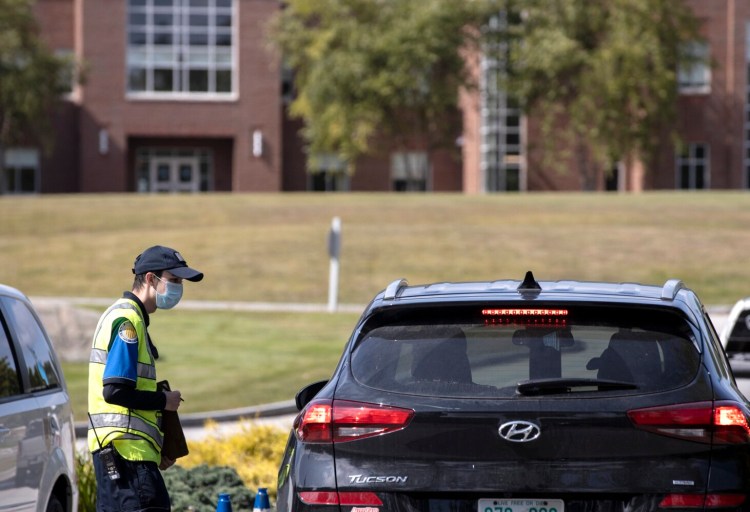Saint Joseph’s College of Maine is implementing a “study-in-place” program after detecting nine cases of COVID-19 on campus.
For at least the next two weeks, the Standish college will deliver all classes remotely and students will be required to stay in their rooms “as much as possible,” President Jim Dlugos said in an announcement Saturday.
“Let’s pull together now, so we can stay together for the semester,” Dlugos said in the announcement. “If you see something that feels unsafe, say it out loud. We’re counting on each other more than ever, so please look out for your neighbor as you would yourself.”
Dlugos said the cases on campus were not widespread, and that contact tracing had linked most of the cases to one residence hall. He did not say which one. All nine students who tested positive are in quarantine, officials said.
Under the “study-in-place” regime, athletic teams will still practice outdoors, with increased safety protocols. Students may still use outdoor spaces, as long as they’re socially distanced and not accompanied by more than one other person.
The campus will be effectively closed to visitors.
Saint Joseph’s reported its first two cases of COVID-19 in a campuswide email on Thursday. The cases were identified through random surveillance testing of students, as well as periodic testing and analysis of campus wastewater, administrators said.
Hundreds of students and faculty members concerned about a lack of widespread asymptomatic testing submitted a petition in August calling for expanded testing. Administrators at the time said that, although they’re not conducting universal testing, they have plenty of testing capacity, with five stations set up around campus that deliver results in 15 minutes.
Dlugos said that universal testing is “not a silver bullet,” and should be combined with a “behavioral approach” that uses infection management precautions such as mask-wearing, social distancing and hand-washing.

A sign reminding students and staff about COVID-19 prevention measures at the Saint Joseph’s College athletic complex on Sunday. Brianna Soukup/Staff photographer
Because Saint Joseph’s has a comparatively large number of commuters, it makes less sense to attempt to test everyone as they arrive and then “seal off” the campus, Oliver Griswold, the school’s chief brand and marketing officer, said in an interview Sunday.
“We knew that universal entry testing wasn’t actually going to work as well,” Griswold said, so administrators turned to a combined strategy of randomized periodic testing and wastewater testing.
The wastewater testing regime allows college officials to narrow the presence of the virus to specific buildings, at which point they can test the people who live in or use those buildings, Griswold said.
“We see this moment as the system working as designed,” he said.
But now that the campus is effectively frozen in place for two weeks, administrators at Saint Joseph’s will test as many community members as they can, according to Griswold.
The college is collaborating closely with the Maine Center for Disease Control and Prevention, and the infected students are doing “really well,” Griswold said.
All nine were asymptomatic at the time they tested positive, and are now studying remotely from isolation housing, he said. College officials just recently dropped off care packages for them with activities and snacks.
Other institutions of higher education in Maine have had a smattering of cases, a handful of which remain active. Bowdoin College has one active case of COVID-19. Colby College has had eight cases cumulatively, all of whom recovered, meaning there are no active cases. Bates College had one active case as of Friday.
At the University of New England, there are no active cases of COVID-19 among the student body, which includes nearly 2,800 students on the Biddeford campus and about 1,200 students on the Portland campus, Sarah Delage, UNE’s director of public relations, said Sunday.
There previously were 11 positive cases among the student body since cases were first reported on Aug. 20, but those cases have all been resolved, Delage said.
The University of Maine System had three active cases across all eight of its schools on Sunday – two at the University of Maine in Orono, and one at the University of Maine at Fort Kent.
Staff Writer Deirdre Fleming contributed to this report.
Comments are not available on this story.
Send questions/comments to the editors.


